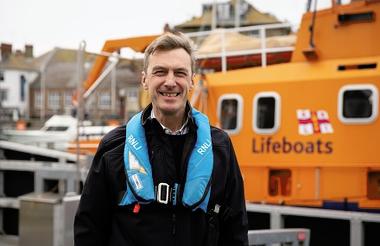Although Peter Sparkes had spent some of his career in the Royal Navy serving alongside the RNLI, he never imagined that one day he would be working as the charity’s CEO.
Sparkes first joined the Royal Navy in 1990; some of his most notable roles included commanding the frigate HMS Cumberland on counter-piracy patrol off the coast of Somalia, and later leading the ice-patrol ship HMS Protector in Antarctica.
While commanding HMS Cumberland, he worked closely with the RNLI by providing support to its Torbay lifeboat during the rescue of the Ice Prince, a cargo ship which encountered difficulties in the English Channel; 20 lives at risk were saved during the operation.
Upon leaving the navy in 2021 after almost 30 years of service, Sparkes first took on a new role as chief executive of the UK Hydrographic Office.
But in June 2024 – around 16 years after working with the RNLI – Sparkes reached what he describes as “absolutely the apogee of my career” and became the charity’s new CEO, replacing his predecessor Mark Dowie.
“I never thought when I walked through the gates of the naval college at Dartmouth in 1990 that I would ever be afforded the privilege of being the chief executive of the RNLI,” Sparkes says.
Scale and complexity
Sparkes says that although he found the transition from being a civil servant at the UK Hydrographic Office to being RNLI’s chief executive “not seamless”, much like his previous experiences, “it is an organisation fundamentally predicated on service.”
“My initial impressions were just of enormous pride and admiration for everyone I’ve met,” Sparkes says of his first few weeks at the RNLI.
“I’ve often said to others that the characteristics you first notice when you come to Poole [the location of RNLI’s headquarters] and you work alongside the RNLI, everyone is smiling, because people are incredibly happy in their work.
“They are unified in the purpose that we have to save lives at sea. And that’s a fundamental ingredient for success. I’ve been fortunate to have that in many organisations that I work in. But this is another level of personal pride in what we do.”
Sparkes, who also volunteers at Help for Homelessness, says his naval background is what principally informs his passion for the role. “As a mariner, to save lives at sea… It doesn’t get much better than that in terms of organisational purpose. I feel that responsibility and trust deeply.”
But his first year has not been without its challenges.
“The first thing was understanding the complexity of the RNLI. I thought I understood complexity and scale, serving in the navy and then working in government and commercially.
“And then I joined the RNLI and realised it was an organisation that had 238 lifeboat stations, 251 lifeguard beaches, 27,000 volunteers, 800 inland branches, fundraising branches, a hotel, three factories, and you just start to think about that – the scale and the complexity.
“But also it’s a personal thing for me – this is probably one of the most cherished and important organisations to our country. And my predecessor handed over to me and said: ‘You know, I’ve carried this Ming vase of an organisation over a heaving, burning deck for five years, and I’m now handing it on to you, my successor.’”
Responding to criticism
Now, over a year into the role, Sparkes has become well acquainted with the challenges of helming an organisation of RNLI’s size. Like many charities, the RNLI has been affected by rising costs and the increase in employer national insurance contributions.
“In any fixed cost organisation, as we are, that is a challenge. And this remarkable organisation is funded entirely by the generosity of our donors and the public.”
For the year ending 31 December 2024, the RNLI received just over £222m of its annual income of £251m from donations and legacies alone. It received just over £4m from government contracts and £50,000 from government grants, although a spokesperson has clarified that the vast majority of this money is sourced from local authorities paying for the lifeguard service the RNLI provides on their beaches, while money received from government grants is spent on international drowning prevention projects.
Depending so heavily on the goodwill of the public, although fruitful, is not without its risks, however.
In a period where anti-immigration rhetoric remains strong in the media, politics and among the general public more broadly, the RNLI has come under fire for rescuing migrants who encounter difficulties when crossing the English Channel in small boats to reach the UK.
Last year, the charity rescued 1,371 people in small boats, but, despite some media outlets’ coverage suggesting otherwise, only 1.2% of its total launches were related to small boat crossings.
The charity has always defended its position as a humanitarian charity dedicated to saving all lives at sea, irrespective of the nationality of the people whose lives it is saving.
Sparkes stands firmly by this. “It’s clearly the most polarising issue in our country, and I recognise that. As the RNLI, we’re a charity that saves lives at sea. We’re a humanitarian organisation and we’ve done so for over 200 years without prejudice or favour.
“We go out and rescue those people who need our help, and we’re tasked by His Majesty’s Coast Guard to help those people in distress, as all other search and rescue assets are. In terms of what that means for us as an organisation, it’s a small but very important part of what we do.”
He cites a historical example of the RNLI saving the lives of German Luftwaffe pilots in the Second World War during the Battle of Britain. “We’re a humanitarian, apolitical organisation, and we save lives at sea. And it’s really important to me that we do that and stick true to our purpose.”
Shifting funding dynamics
Despite the difficult climate in which his and other charities are operating, Sparkes is optimistic.
“I think it’s a very bright future, but largely because we continue to enjoy the trust and confidence of the communities that we serve.
“We don’t take that trust and confidence for granted, but it’s hugely reassuring to everyone that our mission is supported, our people are supported, and that we continue with our life-saving purpose because of that.”
Following the RNLI’s 200th anniversary last year, it is implementing its new five-year plan. Sparkes, who describes himself as “quite an evidence-driven person”, undertook extensive reviews and research to help shape the plan.
“It was clear to me that the nature of life-saving and the sea has changed profoundly in the last 50 years,” he says, citing changes such as the RNLI now rescuing more people, rather than ships, who are closer to the shore.
In light of these changing demographics, the five-year plan is now looking to replace current lifeboats with “a more modern, faster, more responsive, but slightly smaller boat.”
The plan will also aim to reduce the RNLI’s lifeboat fleet from 155 all-weather lifeboats to 100. He adds: “I’m really encouraged having launched the five-year plan and received regional feedback that it’s landed remarkably well with the communities that we support and serve.”
“In many of the communities that we serve, we’re the last flagpole in town – the police station, the fire service, the ambulance service have gone, the banks have gone. In many places, churches have closed. The RNLI is increasingly becoming that community hub in many of those fishing villages.”
In the future, as the RNLI continues to evolve, Sparkes adds: “We’re starting to see opportunities for us to be more civically oriented, enabling access to the lifeboat station for other community groups and so on, because we must sustain the communities from which we operate.”
Beyond the five-year plan, Sparkes also feels that the charity will ultimately need to re-evaluate some of its operations and fundraising methods in future.
“My generation knows the RNLI because of lifeboats, 62% of those under 40 believe the RNLI to be synonymous with lifeguards, and I think that’s going to change over the next few years, as we think about who we interact with and how we work, particularly as we’re fortunate to be afforded so many legacies proportionately to our income.
“Legacies account for 61% of our income, but that dynamic will shift, as the rest of the charitable sector knows, and so we’re going to need to think differently as to how we work with those who wish to support us.”
Despite the challenges, Sparkes is confident in RNLI’s staff to help drive the changes forward.
“It’s a bit of a personal thing, but I look around and everyone around me wants the RNLI to be even better tomorrow than it is today, and that really is a recipe for success.”













